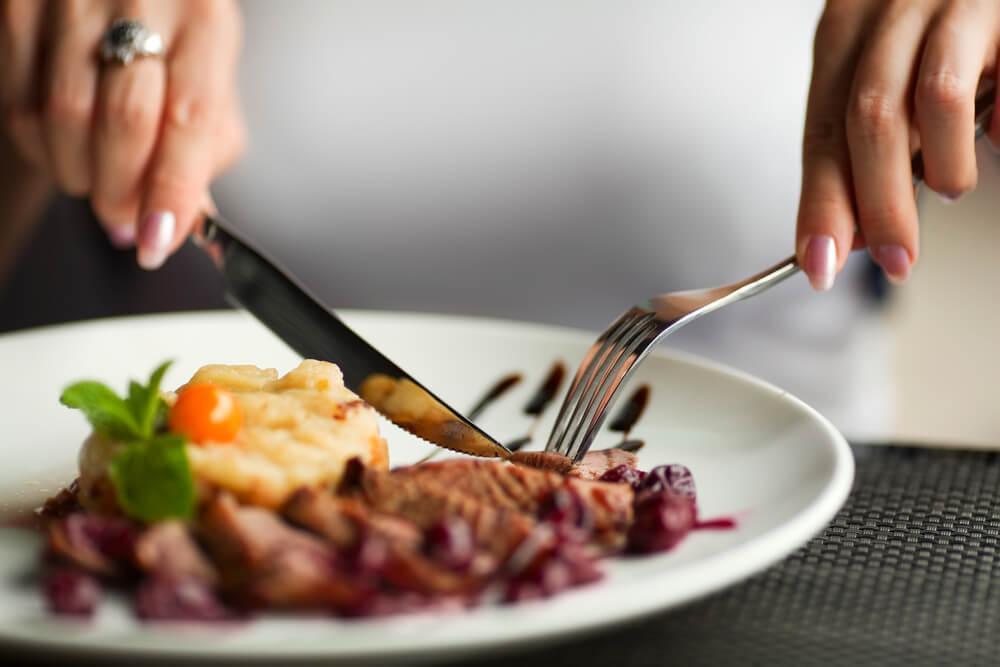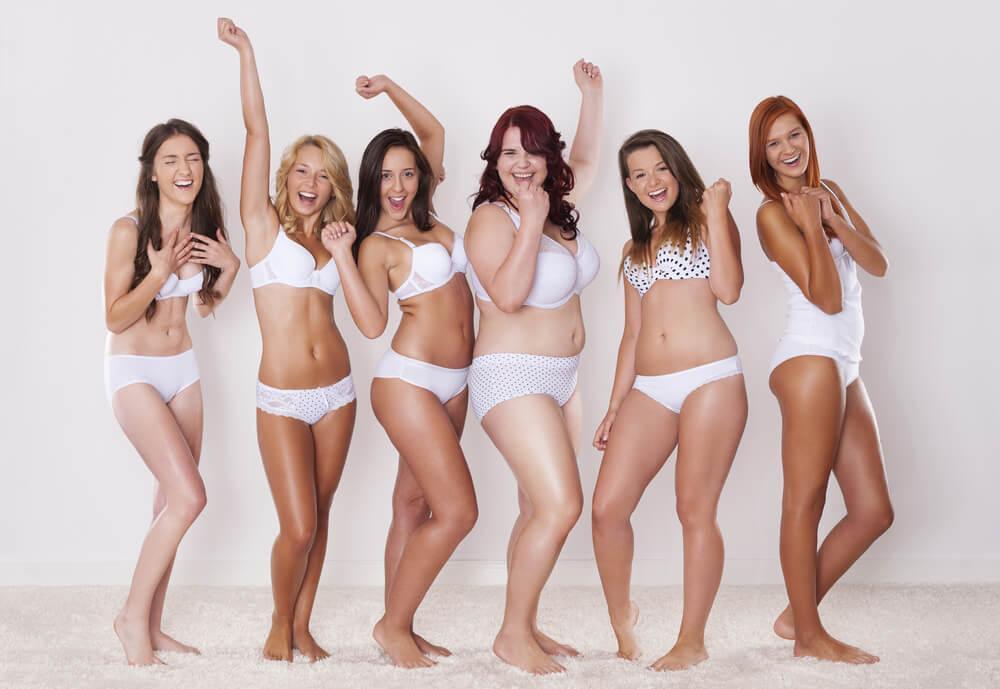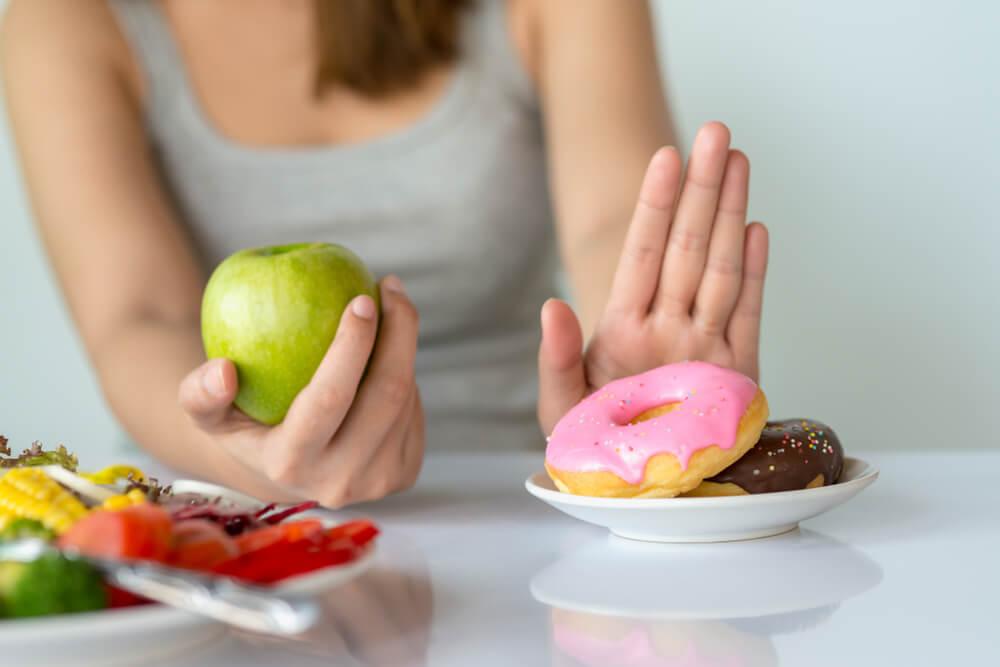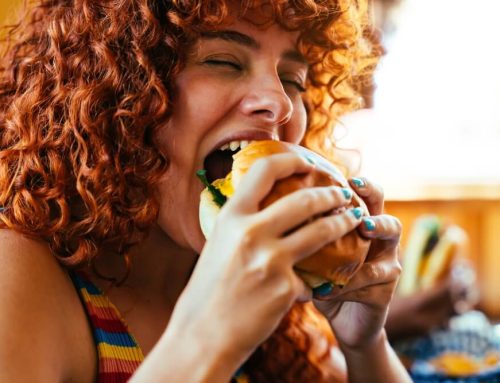
How many times have you tried to go on a diet, only to stop when you realize you simply can’t do it? Or worse, how many times have you gone on a new fad diet only to realize it simply doesn’t work?
Well, there’s been some new research that shows that the best way to nurture your body and bring it to its healthy weight – is by not dieting at all.
Yeah, we know, it sounds a bit odd, considering what we’re exposed to on a daily basis, but it’s really not.
Intuitive eating is quite possibly the best thing to happen to the world of healthy eating since… Well, ever.
History of Intuitive Eating

It was 1995.
NASA’s Galileo spacecraft arrived at Jupiter.
Michael Jordan returned to the NBA. (After retiring in 1993.)
And two people, dietitians Evelyn Tribole and Elyse Resch, decided to challenge the diet fads that seemed to be popping up left and right (and they were, in fact, popping up left and right) and present to the world ten principles of intuitive eating.
The principles that would change the way we perceive food and our relationship with it forever.
Now, even though the term intuitive eating was coined in 1995, some of its concepts had been around since the 1970s (at least).
But then Tribole and Resch decided to write Intuitive Eating – A Revolutionary Program That Works, and the rest is history.
What Is Intuitive Eating?
If you’re looking for a way to lose some weight, you may not find it here.
But, you also could. It depends.
On what, you may ask?
Well, it depends mostly on your body and its very nature.
We are all different when it comes to our bodies. Some are tall, some are short, and some are in between. The same goes for body weight. Some are lean, some are overweight, and some are in between.

That is why intuitive eating cannot be said to exist as a weight loss concept.
Because your body simply might be chubbier than you may think.
But, if you’re healthy, then that is perfectly fine. Perfect, even.
The main goal of intuitive eating is to simply heal our relationship with food and our bodies. Because of the information we are showered with, in most cases, we can develop an unhealthy relationship with food and our bodies. And that can manifest itself in many ways – from developing an eating disorder, to overall stress and anxiety.
The entire process of intuitive eating, the authors of the book say, is nonlinear and personalized. And, its main focus is not actually weight loss, but wellness.
When you read about this diet or that diet, when you hear celebrities on Instagram trying to sell you this “healthy” product or that, you always know that the end goal is – to lose weight. As if weight loss is the ultimate aspiration.
But if it were, we would all be skin and bone.
Weight loss can become an unhealthy fixation, and intuitive eating has been looking to change that.
It aims at changing your relationship with food. Instead of focusing on weight loss, it guides you to focus on long-term health. And the way to do that is to engage in health-promoting behaviors.
Bad Food – Bad Us

So much food has been deemed wrong by companies trying to sell us their product.
First, milk was good.
Now suddenly, milk is bad.
Oil was good for cooking.
Now suddenly, lo and behold, many types of traditional oil are considered bad and ever harmful to your health.
A lot of new information about food surfaces every day. Some foods benefit from that data, while others don’t.
But in the end, what we are left with is an overwhelming sense of guilt for every wrong choice we make food-wise.
Some experts, among them, Tribole and Resch, say that people are born with instincts to eat. They also say that such instincts include even self-regulating one’s food consumption.
But then, an unfortunate thing happens – basically, society and culture. In our culture, the comfort and pleasure that we get from food is replaced with guilt and fear, since everyone’s certain that eating the wrong food will make them fat.
And there is yet another problem. With the natural food movement, even eating healthy food, but that doesn’t come from completely clean sources, is considered bad.
Which only leads to some more guilt.
So, what is left, then?
Well, what is left is trying to shed the guilt away and rely on our own instincts.
Your instincts are not trying to sell you anything, they are not trying to guilt you into anything.
They simply want you to thrive.
And even though this may seem like a difficult road, it is a road that will ultimately bring you to the healthiest you’ve ever been – it will bring your body to its natural state.
10 Principles of Intuitive Eating

While they say there are no rules to intuitive eating, there are, however, principles, that you need to follow if you want this anti-diet to work.
Again, as Tribole and Resch stress, don’t expect to follow them right away. This is a continuous process, so focus on that before calling quits.
- Reject Diet Mentality. The point of this is to refuse to give into the several eons worth of diet culture. Stop expecting that a new diet will appear that will work, “definitely, this time.” Stop expecting diets to work, at all. Most diets you’ve tried have probably caused a deep sense of failure when you regained your weight. Once you free yourself from such expectations, you will be able to commit to Intuitive Eating and truly find your perfect weight.
- Honor Your Hunger. Basically, you need to keep your body fed. Listen to your body and respond when it tells you it’s hungry. You should prevent yourself from getting too hungry, though, because that will trigger a primal drive to eat excessively. Learn to listen to the first biological signal. That way, you will start to trust yourself and your body when it tells you it’s time to eat.
- Make Peace with Food. We sometimes have an… odd relationship with food. You have to admit it – when we’re told not to do something, we most definitely want to do it a billion times more. The same goes for food. When a diet tells us we can’t have a type of food, that seems to be the only thing our body craves. But that only results in uncontrollable cravings and, more often than not, binge-eating. Once you finally decide to give into your cravings, you end up overeating, which further leads to – more guilt. So don’t ban food, let yourself eat what you’d like. Make peace with all food.
- Challenge the Food Police. Precisely because of the aforementioned eons of diets, we have thoughts that tell us which food is “good” and which is “bad.” Those rules are embedded so deep in your brain, that they probably direct your food choices on a daily basis. If you truly want to become an intuitive eater, you will have to challenge those thoughts. Tell them – no, you will not dictate my choices!
- Discover the Satisfaction Factor. When you’re dieting, it is a bit difficult to derive pleasure from the whole eating experience. But, in general, eating is meant to be a pleasurable experience. You should aspire to eat what you really want in a pleasant atmosphere. That way, you will derive pleasure from eating, and this will, in turn, help you to feel satisfied and content, providing you with the means to more easily discern when you’ve had enough.
- Feel Your Fullness. This is a good method to prevent overeating. First, listen to your body when it’s signaling you that you are not hungry anymore. Your body knows how to send you signs that you are full. Another thing you should do is pause while you’re eating to ask yourself how hungry you truly are now and how the food truly tastes.
- Cope with Your Emotions with Kindness. Even before it was a universal truth, the authors of the book realized that, while we mostly eat to satisfy our hunger, there are times when we eat to satisfy some other need. This is called emotional eating and it, as you might have guessed, is not a particularly healthy coping mechanism. If you’re inclined to eat to resolve some other emotion, you’re more likely to lose control and overeat. Also, even food restrictions (i.e. diets) can trigger loss of control, which can also result in emotional eating – that is, something diets are desperate to avoid. You should aim to find kind ways to resolve your issues. While food may temporarily appease what is missing, it won’t do that in the long run. Only you can do that.
- Respect Your Body. Even though there are plenty of people, brands, marketing gimmicks that tell us we should adhere to some universal beauty standard – this is simply not true. We are all different and, no matter how trite it may sound – beautiful. You should learn to respect your body. Stop criticizing it. After all, it’s been with you forever on this wild journey and it will continue to be there for the rest of your life. Don’t hate it – embrace it.
- Movement – Feel the Difference. If you’re an active person, you should know how good it sometimes feels to enjoy an activity. Even though you sometimes lack the motivation. But there’s a solution to that. Don’t focus on how many calories you can burn with some exercise. Focus on how it feels to move your body, focus how exercising makes you feel. This will, in the long run, help you persist in exercising.
- Honor Your Health – Gentle Nutrition. Choosing a meal has a natural progression to it. Most of us, when given the choice, would choose something healthy ultimately. You should aim at choosing food that will be healthy and make you feel good. Again, this comes with a caveat – you don’t actually have to eat healthy all the time. One meal of junk food, if it doesn’t become too frequent, will not hurt you. Perfection is an unattainable notion, and that is something those pushing diets down your throat know. So don’t strive for perfection – strive for progress, and then you will consciously steer your body towards health.
According to one of the authors of the now well-known book, Evelyn Tribole, there are two key ways in which these ten principles work. First, they help you “cultivate attunement to the physical sensations that arise from within your body.” This will get both your biological and physiological needs met, she says. And then, they “remove obstacles and disruptors to attunement,” which, as she stresses, come from the mind “in the form of rules, beliefs and thoughts.”
So basically, first you learn how to eat, and then you learn how to prevent all those thoughts from disrupting your meal and, thereby, disrupting your health.
How to Get Started

If you’re looking to improve your health and your relationship with food, we have to tell you – it’s not an easy process.
But, as we’ve already stressed, it’s a process focused on progress, and not on some (often unachievable) end-goal.
The progress is turned towards self-care. Remember, treat your body with kindness, as you are the expert on it.
The best option, if you’re truly interested in learning how to guide yourself through the process, is to get the book that started it all. If you’re unable to purchase the book, there are numerous resources online, which include a lot of useful information that should help you on your journey.
Another good idea is to start following dieticians who practice intuitive eating. That way, you will be focused on important things when dieting thoughts surface. If you can, you should also let go of the constant reminders of dieting – if you own scales, now would be a time to get rid of them.
But the most important thing here is you – your drive, your willingness to learn about your body and to cherish it. If you are simply tired of constant diets and attempts at losing weight, this might be a good idea for you.
Food is not meant to make you feel bad, it is meant to nourish you and help your body thrive.






Leave A Comment